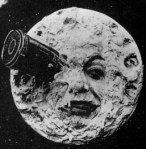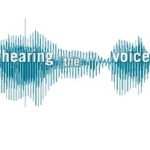 Could Star Trek be considered a serious attempt at scientific thinking? Are scientists akin to novelists in their interpretations of the world? Dr Peter Garratt reviews the debate “Is Great Science Great Science Fiction?” held at Durham Book Festival 2013 as part of the Hearing the Voice project.
Could Star Trek be considered a serious attempt at scientific thinking? Are scientists akin to novelists in their interpretations of the world? Dr Peter Garratt reviews the debate “Is Great Science Great Science Fiction?” held at Durham Book Festival 2013 as part of the Hearing the Voice project.
If, according to Friedrich Nietzsche, natural science affords “only an interpretation and arrangement of the world,” then what is to be made of the suggestion that Star Trek is a serious attempt at scientific thinking? Are scientists best regarded as interpreters and arrangers, perhaps akin to novelists, or is the analogy between science and literature a dangerous error that confuses two different orders of knowledge?
These questions were addressed with entertaining joie de vivre in a formal debate organised by Hearing the Voice, a project funded by the Wellcome Trust, as part of the 2013 Durham Book Festival. Supporting the motion that ‘This House believes that great science is great science fiction’ were Professors Patricia Waugh and Tom McLeish, both from Durham University and respectively a literary critic and a physicist. Speaking against the motion were their opponents, Andrew Crumey, a novelist and former physicist, and the SF writer Ken MacLeod. To the enjoyment of the large book festival audience, rhetorical advantage swung back and forth between them. (Only a klaxon kept each speaker to their allotted 10 minutes, sounded valiantly by the Chair, Dr Felicity Callard.) Voting via individual keypads, audience members at first expressed an inclination to support the motion, with 57% in favour; a second and deciding vote at the end determined whether minds had been swayed.
Arguments in favour of the motion took some care not to rehearse versions of relativistic arguments made familiar by past postmodernist skirmishes with scientific realism. Waugh and MacLeish were far more concerned with models of complexity in both science and culture than with resuscitating the ailing “two cultures” terms of reference – which, MacLeish wryly noted, the opposition wished to do. Crumey observed that what made science distinctive was its procedures and objectives, which differed from the fictional truth pursued by novelists, for example; the goal of factual rightness always set science’s realm apart.
MacLeod noted in a sympathetic vein that “nature doesn’t care how beautiful our stories are,” and that a reader’s faith in an imagined SF universe can be destroyed by “an ugly fact” in a way that nature itself cannot be. Iain M. Banks’s novels are highly complex projected worlds – but entirely lacking real science’s referential duty. Yet, the proponents countered, great scientific figures such as Robert Hooke or Humphrey Davy have almost always cast theories in the form of narrative, drawing on fiction’s exploitation of narrative development, surprise, reversal and excitement. Is Dawkins’s selfish gene not the most “slippery character,” Waugh proposed. Moreover, literary experience positions the reader as a kind of scientific observer, faced with new hypotheses of reality, with data and inferences, with maps of the real, with constructive uncertainties, with scepticism, with placeholders for what cannot be known, and so on, along with some higher self-conscious awareness of those very processes of construal and world-making.
With a resounding final Chair’s klaxon, following some tough questioning from the audience, the debate was concluded. The audience’s verdict? After resolving some technical worries over voting the final scores came in: a virtual dead heat, 51/49 in favour of the opposition. During the warm applause, perhaps some felt the result was itself just good science fiction.
Durham Book Festival is the North East’s biggest annual celebration of books. Although it has now ended, the Festival team would love to have your feedback and comments on this year’s events. A number of other reviews and features relating to DBF 2013 are also available on READ.
 This particular debate was organised by the Hearing the Voice project. This aims to help us better understand the phenomenon of hearing a voice no one else can hear (a phenomenon also referred to as auditory verbal hallucinations), its cognitive-neuroscientific mechanisms, its social, cultural and historical significance, and its therapeutic management.
This particular debate was organised by the Hearing the Voice project. This aims to help us better understand the phenomenon of hearing a voice no one else can hear (a phenomenon also referred to as auditory verbal hallucinations), its cognitive-neuroscientific mechanisms, its social, cultural and historical significance, and its therapeutic management.




Reblogged this on The Digital Humanities Centre.
LikeLike